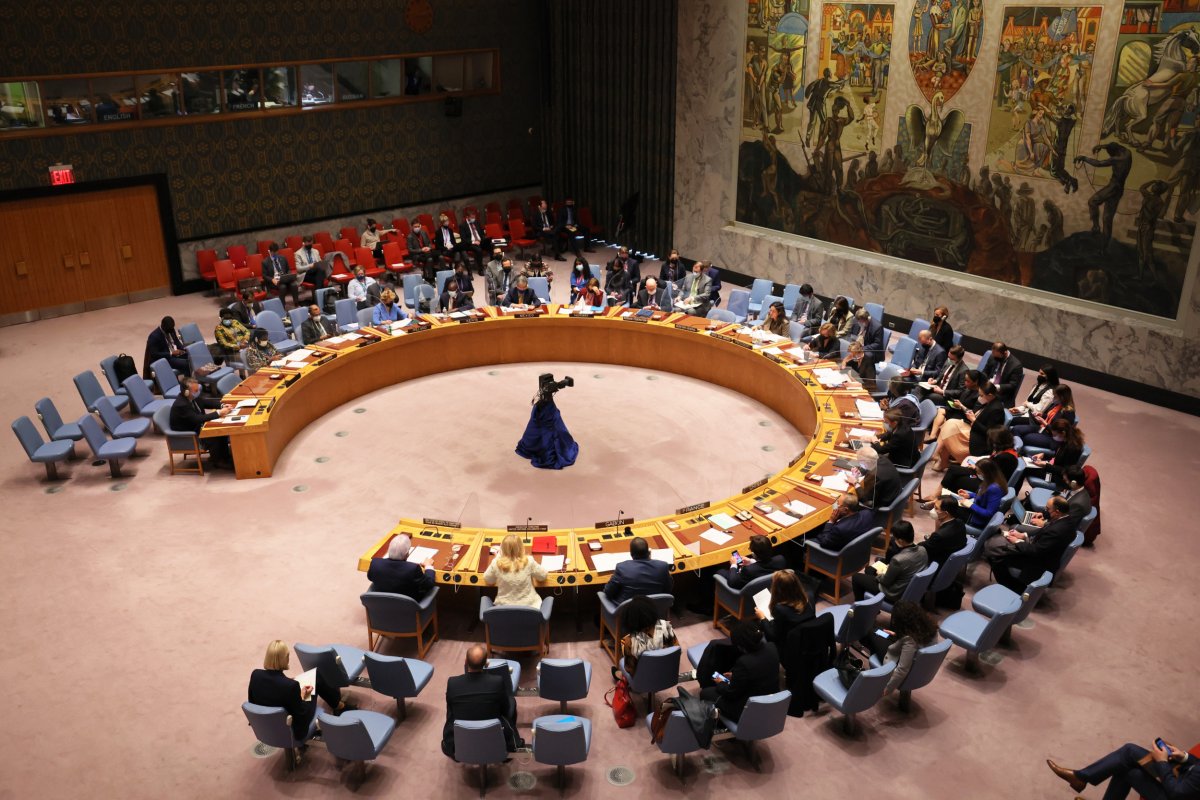The West's continual transfer of large numbers of lethal weapons into the hands of Ukrainian defenders may exacerbate its war with Russia, China's envoy told the United Nations.
With Russian President Vladimir Putin's military campaign nearing its two-week mark and his forces on the outskirts of Kyiv, the United States and its NATO allies have already supplied Volodymyr Zelensky's Ukraine with tens of thousands of precision weapons such as shoulder-launched anti-aircraft and anti-tank rockets—and many more are on the way.
Over the weekend, Secretary of State Antony Blinken hinted at some progress in a proposal to transfer Poland's Soviet-era MiG-29 fighter jets to Ukraine's air force, a move that would be contingent on a guarantee of Poland later receiving American-made replacements. However, there are also concerns that such an agreement could be interpreted in Moscow as some form of Western intervention in the invasion.
China, meanwhile, has expressed a readiness to mediate between Kyiv and Moscow, but beyond urging the two governments to hold direct talks, Beijing has done little to leverage Chinese President Xi Jinping's close relationship with Russia's Putin.
On Monday, as the UN Security Council met for the fourth time in 15 days, China's ambassador, Zhang Jun, issued direct warnings about the ongoing foreign military aid and Ukraine's own attempts to beef up local resistance through an "international legion" of volunteer fighters.
"Any action that is conducive to easing the situation under political settlement will receive China's support," said Zhang. "Any action that is not conducive to promoting a diplomatic solution, and which in essence means fanning and fueling the flames, leading to escalation, will be met with China's opposition."
He repeated Beijing's objection to global sanctions—unprecedented economic punishment that is crippling Russia's economy—and said the measures could spill over and harm other countries, too.
"Importing offensive weapons into Ukraine and sending mercenaries may further worsen the situation and create more and bigger risks," Zhang said, before encouraging more peace talks.
Follow Newsweek's live blog for the latest on the Russia-Ukraine war.
Concern Over Loss of Life
Since Putin issued orders to attack Ukraine on February 24, China has publicly maintained a position described by some analysts as "pro-Russia neutrality," refusing to condemn the violence while taking Moscow's view of the U.S. and NATO as "instigators" of the conflict. As in Russia, statements out of China have been careful to avoid describing the hostilities as an "invasion" or even "war."
However, with the number of casualties now in the thousands—and the Chinese government reporting at least one of its citizens wounded by gunfire—Beijing has expressed alarm at the catastrophic loss of life in the country.
"We remained concerned about the rapidly changing situation in Ukraine, and deeply deplore the increasing number of civilian casualties," said Ambassador Zhang. "We appeal for the maximum degree of restraint and intensification of diplomatic efforts, so as to put an early end to the fight ... and prevent the emergence of a large-scale humanitarian crisis."
During his remarks at the UN headquarters in New York, where representatives had gathered to discuss the deteriorating humanitarian situation, Zhang conveyed Beijing's "heartfelt thanks" to neighboring countries, including much-maligned NATO members, for receiving Chinese nationals fleeing the war. He also continued China's diplomatic tightrope walking by repeating vague support for Kyiv's principled stand and reminding participants of Moscow's grievances surrounding NATO's eastward expansion.
"That the situation in Ukraine has deteriorated to where it is today is due to a combination of complex factors. To resolve complex issues, what is required is calm and reason, rather than adding fuel to the flame, which will only lead to escalation," he said.
Seeking 'Dialogue and Negotiation'
"To resolve the crisis in Ukraine, it is imperative to abide by the principles and the purposes of the UN Charter; respect and ensure the sovereignty and territorial integrity of countries; abide by the principle of the indivisibility of security; and address the reasonable security concerns of the parties concerned. It is imperative to stick to dialogue and negotiation, and find the resolution to the dispute through peaceful means," Zhang said.
Monday's session began after Russia promised another cease-fire for the evacuation of civilians from Kyiv, Chernihiv, Sumy, Kharkiv and Mariupol. UN officials condemned the war and especially its effects on young children, 27 of whom have been killed, with 42 others wounded, according to Catherine Russell of the UN Children's Fund, better known as UNICEF. Half of the 1.7 million refugees who have fled Ukraine are children, she said in her remarks.
The UN's human rights office estimated there had been at least 406 civilian deaths and 801 injuries as of Monday. U.S. intelligence officers told Newsweek that the real figure was likely five times higher.
Linda Thomas-Greenfield, the U.S.'s permanent representative to the UN, told the Security Council that Russia needed to provide a "firm, clear, public and unequivocal commitment" to allow humanitarian access to war zones in Ukraine.
"The humanitarian toll of President Putin's war on Ukraine is mounting. Children are dying, people are fleeing their homes—and for what?" Thomas-Greenfield said in her remarks. "It's clear Mr. Putin has a plan to destroy and terrorize Ukraine."
"We continue to call on Russia to change course, withdraw its forces, deescalate through diplomacy, and we support Ukraine's call for a cease-fire," she said.

Uncommon Knowledge
Newsweek is committed to challenging conventional wisdom and finding connections in the search for common ground.
Newsweek is committed to challenging conventional wisdom and finding connections in the search for common ground.
About the writer
John Feng is Newsweek's contributing editor for Asia based in Taichung, Taiwan. His focus is on East Asian politics. He ... Read more
To read how Newsweek uses AI as a newsroom tool, Click here.








